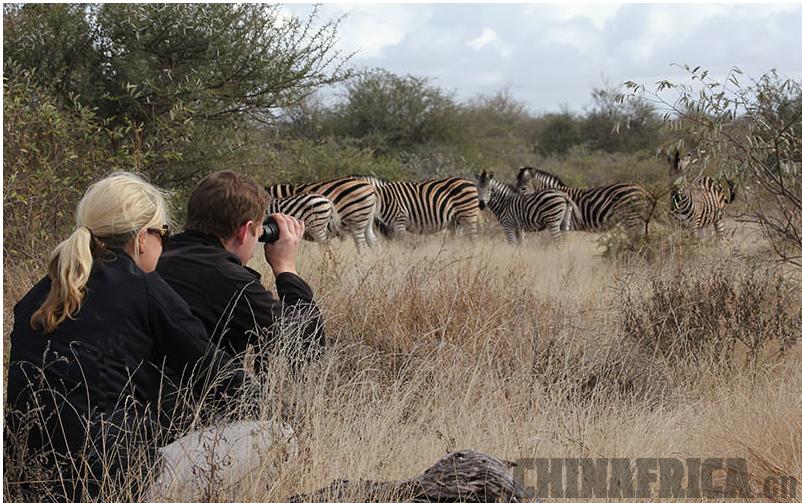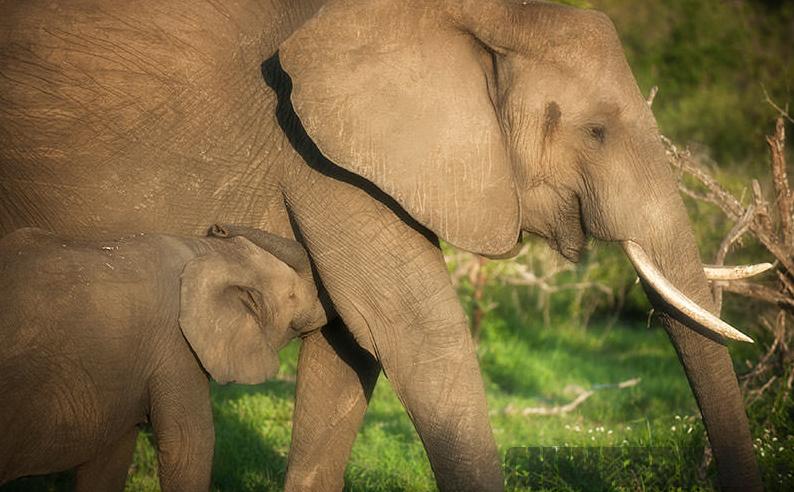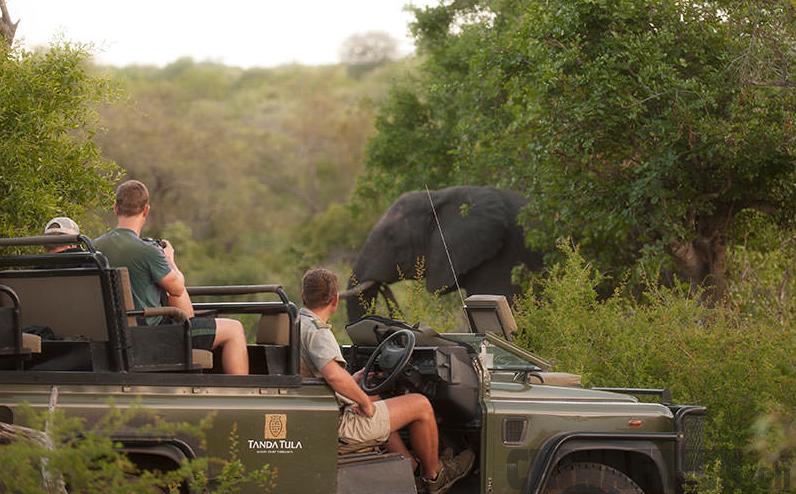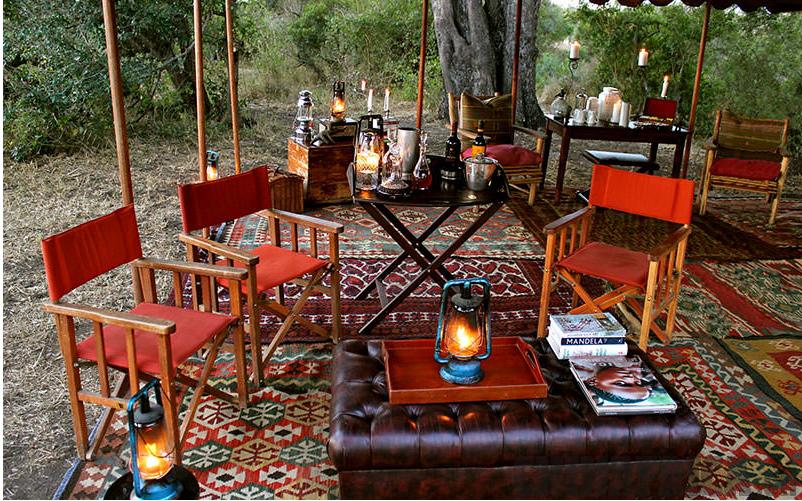|    
The magic of Tanda Tula Safari Camp
Photos courtesy of tandatula.com
Is my tent under attack? I storm out from the bathroom where I was merrily and unsuspectingly getting dressed for dinner to survey the source of the beastly noises.
I fumble with the torch. It's not working properly or maybe it could be my hands are shaking too much. All I can make out in the dark is a gargantuan, snorting black shape, about 10 meters from my verandah and it seems it's coming my way fast. Do I use the horn emergency thingie to signal for help? But then, just as I examine all my options frantically, the buffalo (which I later learn it was) walks – or rather thunders – slowly past me onto the next delicious patch of grass, still snorting menacingly. In Africa, "you'll never walk alone", is not the title of a kwazi-religious song – it's a credo. The animals are all free-roaming here and bumping into a lion, buffalo or rhino in the dark is not on my to-do list anytime soon.
After I calm myself down with an aperitif, I sit on the verandah and take in the night orchestra in surround-sound. The peace and sense of timelessness of an African night never fails to strike me with alacrity.
My location is Tanda Tula Safari Camp, in the heart of the Timbavati Private Nature Reserve, adjacent to the Kruger Park in South Africa. The Timbavati Private Nature Reserve came into existence in July 1956 when a group of game farm owners on the western boundary of the Kruger National Park formed the Timbavati Association. Set on the banks of the Nharalumi riverbed, Tanda Tula is shaded by stately trees and overlooks a water hole that attracts a wide variety of game from dawn to dusk.
Luxury personified
Tanda Tula is an intensely private affair. One of the most luxurious tented safari camps in southern Africa, it has only twelve tents, and personal attention is simply a matter of course.The thatched en-suite tents are imbued with the romance of Africa. Wide wooden decks and spacious bathrooms with Victorian baths and outside showers are reminiscent of a bygone era.Finally I'm escorted safely to the dining area where guest areas include a traditional boma for dining under the African stars, a thatched lounge with an open-sided bar overlooking a waterhole, a swimming pool and a curio shop.We are treated to traditional African cuisine – a "braai" or barbeque comprising springbok sausage, wild boar and various accompaniments. The wine is equally up to snuff. Then it's off to my glorious tented sanctuary with its fresh, soft linen and the far-off sounds of the bush, lulling me to sleep. Not for long though. During the night the roar of the lions wake me up three times…
Save the elephants
The next morning, after a scrumptious breakfast, we are given a fascinating talk about the "Save the Elephants" project, run from Tanda Tula.For the past five years,Tanda Tula has served as the main sponsor for the Save The Elephants Transboundary Elephant Research Project. The study tracks the movements of elephants in order to enable the reserve to make informed management decisions.According to Ziggy, one of the researchers involved in the project, they identify individual elephants, study population dynamics and habitat use, and examine the effects of elephants on key tree species. "We experiment with methods of alleviating elephant tree damage and provide scientific knowledge to all stake holders," she says.
Ziggy's knowledge is quite staggering (she is busy with her Masters on the subject) and she tells us that there are only approximately 600,000 elephants left on the entire African continent. "There always seem to be problems of too many elephants in the south where we are but most people don't really understand just how endangered these animals are."
According to the website, (www.savetheelephants.org),Save the Elephants has been at the forefront of developing live tracking technology to monitor and interpret elephant movements since 1995. The technology is constantly being updated and improved. Bulky radio-tracking collars are being replaced by GPS collars, and STE are now pioneering a project using GSM mobile phone technology in collaboration with Safaricom.
With GPS collars, researchers receive live information on elephants' location and movements. Animals can be continuously monitored in places where intensive study is impossible, gathering frequent data and generating detailed maps of elephant movements. Overlaying range maps with GIS (Global Information Survey) data gives researchers valuable clues as to elephant motivation.
It is essential to obtain detailed information on elephant movements and seasonal dispersal patterns in order to protect and manage elephant populations effectively. Knowledge of fine-scale movements, obtained from GPS tracking, has enabled researchers to examine the routes used by elephants in moving from one part of their range to another.
Comprehensive database
Since December 1996 the researchers have amassed a comprehensive database totaling well over 2000 elephant days. Study areas include the protected areas of Samburu and Buffalo Springs national reserves, Ilngwezi conservation area, Lewa Wildlife Conservancy, Borana Ranch, Namunyak Wildlife Conservation Trust, Meru and Amboseli National Parks, Shimba Hills National Forest Reserve, and surrounding unprotected areas in Samburu, Isiolo, Laikipia, Kajiado and Kwale Districts.
The information is used by managers in developing land-use plans to establish protected corridors and minimize conflict with surrounding communities. The relevance of this important research was highlighted by the recognition, at the 5th World Parks Congress in September 2003, of the importance of corridors in planning for meta-populations and the need to integrate local people and un-protected areas with national parks and wildlife agencies in management planning and conservation.
Their approach to conservation is rational, scientific, holistic and a far cry from the hysterical, emotive – and sometimes dangerous – animal rights activists groups and I'm thankful that the future of our gentle giants are the hands of these clever, responsible people.
After a scrumptious "bush breakfast" it's off home. My trip to Tanda Tula seems to have gone by in the blink of an eye. I would like to spend a week here; walking with the elephants, drinking in the peace of the bush and, well, simply come alive again… And I will.
Tanda Tula has recently launched theTimbavati's first ever luxury"Overnight Walking Safari."The Overnight Walking Safari provides an opportunity for nature lovers and adventure seekers to experience the beautiful African wildlife on foot and up close and to sleep under the stars, exactly as the early explorers did. Each Walking Safari itinerary is individually tailored to suit guests' requirements. A four-night walking safari package is generally recommended, with two nights spent at the base Tanda Tula Safari Camp and two nights in the bush at the remote Machaton Hide.
BR Africa Travelwill shortly be doing a review for you of this trip so stay tuned…
Contacts:
TANDA TULASAFARI CAMP TEL: + 27 (0) 15 793 3191. FAX: + 27 (0) 15 793 0496. E-MAIL:reservations@tandatula.co.za. www.tandatula.co.za
Save The Elephants:
Tel: + 27 (0) 15 793 0369
FAX: + 27 (0) 15 793 0496
michelephant@worldonline.co.za
Getting there:
Travel information for Beijing, China to Johannesburg, South Africa
· Beijing, China is 7,275 miles from Johannesburg, South Africa
· There are 2 weekly flights from Beijing, China to Johannesburg, South Africa
· Air China has the most nonstop flights between Beijing, China and Johannesburg, South Africa
· Abu Dhabi, United Arab Emirates - Abu Dhabi Intl is the most popular connection for one stop flights between Beijing, China and Johannesburg, South Africa
In-Flight Information
· The average flying time for a direct flight from Beijing, China to Johannesburg, South Africa is 15 hours 20 minutes
· Most direct flights leave around 0:00 KRAT
Go tohttp://www.tripadvisor.com/Flights-g312578-o294212-Beijing_to_Johannesburg.html or http://www.cheapflights.co.za/flights-to-Beijing/Johannesburg/ for more information.
Once at Johannesburg Airport,a connecting flight to Eastgate Airport in Hoedspruit is the next step in getting there. The reserve is about 15km from the airport, which makes a transfer to the reserve very easy.
Charter flight to the park may also be arranged by your tour operator.
Renting a car or catching a shuttle in Johannesburg and driving to Timbavati is another option. The park can be found on the R40 near Hoedspruit, and west of Kruger National Park. The 450-km drive takes nearly 5 hours.
Go tohttps://www.safaribookings.com/timbavati/getting-therefor more information.
|